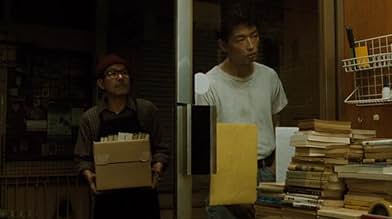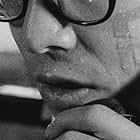At the very start of THE DRUDGERY TRAIN, the narrator tells us a couple of pertinent facts about Kanta Kitamachi at that prove to be significant to the direction his life is going. Kanta is 19 year-old, his father committed a sex crime that broke up his family while he was in 5th Grade, and since dropping out of school after graduating junior high, Kanta has only had work as a day labourer. The freeze-frame image of him leaving a seedy peep-show joint during this opening narration speaks for itself.
A day labourer, with no contract and no rights, Kanta has little opportunity for advancement out of this life of back-breaking manual labour. What little money he earns he spends on alcohol, on peep shows and massage parlours and, owing four months' rent, he's about to be thrown out of his cheap rented accommodation. Kanta however is not entirely beyond hope. He loves reading and has a crush on the girl who works at the bookstore, but he confuses sex with his need for the warmth of human contact and friendship. His means of expression is so awkward, crude and inappropriate that he ends up alienating everyone close to him and getting his head kicked in by those less sympathetic towards him.
Based on a novel by Kenta Nishimura, one suspects that there's some autobiographical content in Kenta's story, so it might be a stretch to extrapolate an individual anecdotal story to see it as a reflection of a generational problem. Undoubtedly however it would seem like Kanta's education, his development as a young man, his relationships and his prospects for the future in post-bubble economy Japan have indeed been influenced or affected to some extent by the actions of his elders, as is suggested by the unspecified sex crime of his father. "Nothing good will happen to you for the rest of your life" a work colleague tells him, and indeed it's hard to see how Kanta can turn his life around. Is it a kicking Kenta needs or a kick up the pants?

















